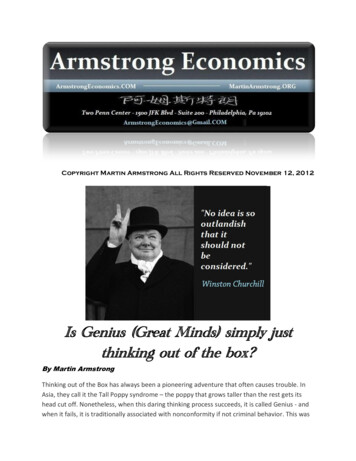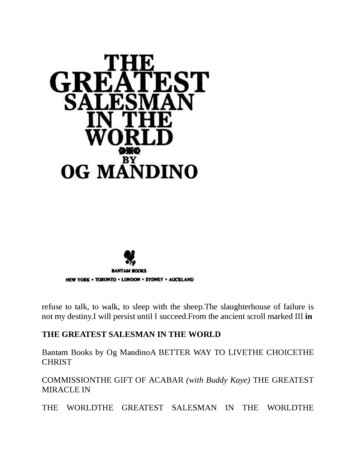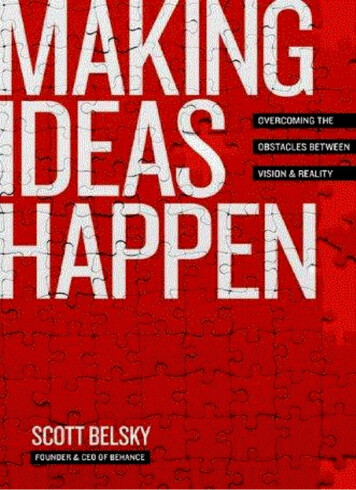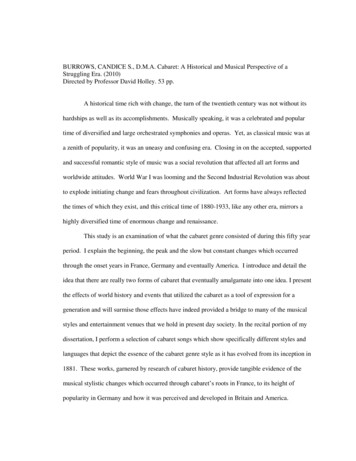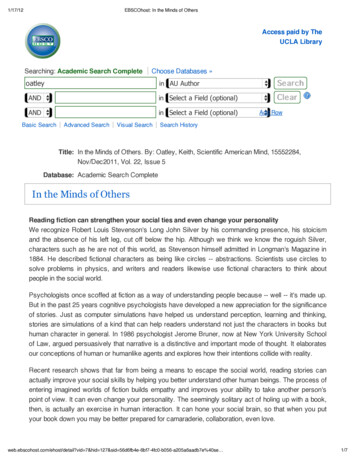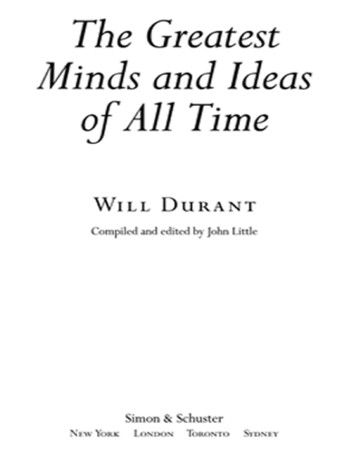
Transcription
BY WILL DURANTThe Greatest Minds and Ideas of All TimeHeroes of HistoryThe Story of PhilosophyTransitionThe Pleasures of PhilosophyAdventures in GeniusBY WILL AND ARIEL DURANTThe Story of CivilizationI.OUR ORIENTAL HERITAGEII.THE LIFE OF GREECEIII.CAESAR AND CHRISTIV.THE AGE OF FAITHV.THE RENAISSANCEVI.THE REFORMATIONVII.THE AGE OF REASON BEGINSVIII.IX.X.THE AGE OF LOUIS XIVTHE AGE OF VOLTAIREROUSSEAU AND REVOLUTION
XI.THE AGE OF NAPOLEONInterpretations of LifeThe Lessons of History
The Greatest Minds and Ideas of AllTimeWILL DURANTCompiled and edited by John LittleSimon & SchusterNEW YORK LONDON TORONTO SYDNEY
SIMON & SCHUSTERRockefeller Center1230 Avenue of the AmericasNew York, NY 10020Copyright 2002 by John Little, Monica Ariel Mihell, and William JamesDurant EastonAll rights reserved, including the right of reproduction in whole or in partin any form.Simon & Schuster and colophon are registered trademarks of Simon &Schuster, Inc.For information regarding special discounts for bulk purchases, pleasecontact Simon & Schuster Special Sales at 1-800-456-6798 orbusiness@simonandschuster.comDESIGNED BY PAUL DIPPOLITOManufactured in the United States of America7 9 10 8Library of Congress Cataloging-in-Publication DataDurant,Will, date.The greatest minds and ideas of all time/Will Durant; compiled and editedby John Little.p. cm.Includes index.1. Civilization—History. 2. Intellectual life—History. I. Little, John R.,date. II. Title.CB69.D86 2002909—DC21 2002075852ISBN: 978-0-743-23553-2
eISBN-13: 978-1-439-10714-0www.SimonandSchuster.com
If a man is fortunate he will, before he dies, gather up as much as hecan of his civilized heritage and transmit it to his children.And to hisfinal breath he will be grateful for this inexhaustible legacy, knowingthat it is our nourishing mother and our lasting life.—WILL DURANTKeeping the above observation of Will Durant’s in mind, I shoulddedicate this compendium of the peaks of our human heritage to allchildren, and more prejudicially, to my children: Riley,Taylor, Brandon,and Benjamin; that they may learn and experience the noble strain inhumanity and learn that man is capable of such great things that eventhe gods might be envious.—JOHN LITTLEAnd to Edward and Benny Easton,whose grandparents worked so hardthrough so many decades to deliver this gift to them.
ContentsIntroduction ·CHAPTER ONEA Shameless Worship of Heroes ·CHAPTER TWOThe Ten “Greatest” Thinkers ·CHAPTER THREEThe Ten “Greatest” Poets ·CHAPTER FOURThe One Hundred “Best” Books for an Education ·CHAPTER FIVEThe Ten “Peaks” of Human Progress ·CHAPTER SIXTwelve Vital Dates in World History ·Index ·
The Greatest Minds and Ideas of All Time
IntroductionIn 1968, shortly after winning the Pulitzer Prize for literature, Will Durantand his wife, Ariel, consented to a television interview to be conducted intheir home in Los Angeles, California. The interviewer, who fanciedhimself something of an intellectual, posed to Durant the followingquestion:If I were to ask you to name the person who has most influenced ourcentury (the 20th century) would it be Karl Marx?Durant paused for a moment and then replied:Well, if you use the word in its largest sense,we would have to give thegreatest share of influence to the technical inventors, to men like Edison.Doubtless the development of electricity has transformed the world evenmore than any Marxian propaganda. Then, if you think in terms of ideas, Ithink the influence of Darwin is still greater than the influence of Marx, butin a different field. The basic phenomenon of our time is not Communism;it’s the decline of religious belief,which has all sorts of effects on moralsand even on politics because religion has been a tool of politics. But todayin Europe it ceases to be a tool, it has very little influence in determiningpolitical decisions—whereas 500 years ago, the pope was superior ininfluence to any civil ruler on earth.Later, during the same interview, the interviewer turned to his subject andasked:Dr. Durant, of all the characters populating The Story of Civilization,whom would you have most liked to have known?Durant contemplated the question seriously and then, poker-faced, replied,“Madame De Pompadour.”The interviewer was dumbfounded.“Why is that?” he asked.
A twinkle came to Durant’s eyes as he answered, “Well, she was beautiful,she was charming, she was luscious—what else do you want?”I cite these two anecdotes not simply to reveal Durant’s views on theinfluence of inventors and biologists on human history, nor even histendency to use wit to disarm journalists who took themselves or theirvocations too seriously (he once noted that humor is akin to philosophy forthey are both viewpoints born of a large perspective of life), but rather toshow that his opinion on assessing the significance of individuals andevents from human history was something that was constantly sought after—sometimes twice in the same interview.It is entirely understandable that Durant should find himself asked toanswer such questions.Any time a man spends over half a centuryresearching and writing an eleven-volume integral history of civilization, itis natural that people are going to want to know what conclusions he hasdrawn from the enterprise; to know what eras, individuals, andachievements stood out in his mind as being the greatest or mostsignificant.Who, for example, would Durant rate on his Roll of Honor ofhuman thought as the greatest thinkers in human history? Who would herate as the truly great poets; the ones that plucked notes upon heartstringsthat continue to resonate hundreds and thousands of years after theirpassing? And what would be the absolute best books one should read inorder to receive a meaningful—and useful—education? Over the course ofDurant’s career, he responded to the increasing public demand for suchqualified assessments by putting pen to paper and crafting a series of essayscontaining his personal ranking of “The Ten Greatest Thinkers,” “The TenGreatest Poets,” “The One Hundred Best Books for an Education,” “TheTen Peaks of Human Progress,” and “Twelve Vital Dates in WorldHistory.” Certain of these essays were published in periodicals; others werepresented as lectures to standing-room-only attendees. However, unlessyou happened to purchase those magazines, or were fortunate enough toattend one of those lectures, it would not have been possible to learn of hisconclusions in these matters. Fortunately, all of these essays have beenbrought together in The Greatest Minds and Ideas of All Time.To formulate a ranking system and then apply it to such a broad array ofhuman achievement is a difficult undertaking, to be sure, but Durant (asalways) succeeds brilliantly; he not only presents compelling evidence for
his selections, but also stimulates the reader to form his or her ownopinions and to look beyond immediate surroundings and present cultureand into a timeless realm, which he called “The Country of the Mind,” asort of cerebral retirement home wherein the heroes of our species dwellafter having served their time and purpose in their respective eras andwhere to be human is something to be lauded. Indeed, the title of the firstchapter of this book serves to frame its very thesis: “A Shameless Worshipof Heroes.”The philosophy that resonates from the pages of all of Durant’s books, butmost particularly in The Greatest Minds and Ideas of All Time, isunabashedly “prohuman” and serves to underscore the splendor of ourintellectual and artistic heritage. In fact, Durant was known as the “gentlephilosopher” and the “radical saint,” as he always sought to report on thepositive achievements in human events and history. In a sentence, Durantchose to illuminate with his pen the mountain peaks of greatness in ourspecies’ history.The Greatest Minds and Ideas of All Time is a book containing the absolutebest of our heritage passed on for the edification and benefit of futuregenerations, replete with Durant’s renowned erudition, wit, and uniqueability to explain the profoundest of events and ideas in simple and excitingterms. It is a book that serves both as a wonderful introduction to thewritings of Will Durant and as a summing up, a quantification of genius, atravel guide to the “must-see” stops in the landscape of human history.In many respects this book is a wonderful and logical companion volume toDurant’s Heroes of History. Most notably, whereas Heroes of History is anoverview of over one hundred centuries of human achievement, TheGreatest Minds and Ideas of All Time provides Durant’s personalassessment of it. Moreover, The Greatest Minds and Ideas of All Timecontains profiles of three individuals (Darwin, Keats, and Whitman) thathad been intended for inclusion in the Heroes of History book, but owing toa series of personal calamities, culminating in Durant’s death in 1981, wereomitted from the text (indeed, the intended final two chapters of Heroes—Durant’s last book—would never be composed).Through prose that rises at times to the heights of poetry, The GreatestMinds and Ideas of All Time is an extension of Durant’s long-standing
invitation to enter the world of the “best of the best,” and a means by whichone can come to recognize and befriend genius. The dividends from suchan enterprise are many, for as Durant once noted:We cannot live long in that celestial realm of all genius withoutbecoming a little finer than we were.And though we shall not find therethe poignant delirium of youth,we shall know a lasting, gentlehappiness, a profound delight which time cannot take from us until ittakes all.—John Little
CHAPTER ONEA Shameless Worship of HeroesOF THE MANY IDEALS which in youth gave life a meaning and radiancemissing from the chilly perspectives of middle age, one at least hasremained with me as bright and satisfying as ever before—the shamelessworship of heroes. In an age that would level everything and reverencenothing, I take my stand with Victorian Carlyle, and light my candles, likeMirandola before Plato’s image, at the shrines of great men.I say shameless, for I know how unfashionable it is now to acknowledge inlife or history any genius loftier than ourselves. Our democratic dogma hasleveled not only all voters but all leaders; we delight to show that livinggeniuses are only mediocrities, and that dead ones are myths. If we maybelieve historian H. G.Wells, Caesar was a numbskull and Napoleon a fool.Since it is contrary to good manners to exalt ourselves, we achieve thesame result by slyly indicating how inferior are the great men of the earth.In some of us, perhaps, it is a noble and merciless asceticism, which wouldroot out of our hearts the last vestige of worship and adoration, lest the oldgods should return and terrify us again.For my part, I cling to this final religion, and discover in it a content andstimulus more lasting than came from the devotional ecstasies of youth.How natural it seemed to greet the great Indian poet Rabindranath Tagoreby that title which so long had been given him by his countrymen,Gurudeva (“Revered Master”)—for why should we stand reverent beforewaterfalls and mountaintops, or a summer moon on a quiet sea, and notbefore the highest miracle of all: a man who is both great and good? Somany of us are mere talents, clever children in the play of life, that whengenius stands in our presence we can only bow down before it as an act ofGod, a continuance of creation. Such men are the very life-blood of history,to which politics and industry are but frame and bones.
Part cause of the dry scholasticism from which we were suffering whenJames Harvey Robinson summoned us to humanize our knowledge was theconception of history as an impersonal flow of figures and “facts,” inwhich genius played so inessential a role that histories prided themselvesupon ignoring them. It was to Karl Marx above all that this theory ofhistory was due; it was bound up with a view of life that distrusted theexceptional man, envied superior talent, and exalted the humble as theinheritors of the earth. In the end men began to write history as if it hadnever been lived at all, as if no drama had ever walked through it; nocomedies or tragedies of struggling or frustrated men. The vivid narrativesof Gibbon and Taine gave way to ash-heaps of irrelevant erudition in whichevery fact was correct, documented—and dead.No, the real history of man is not in prices and wages, nor in elections andbattles, nor in the even tenor of the common man; it is in the lastingcontributions made by geniuses to the sum of human civilization andculture. The history of France is not, if one may say it with all courtesy, thehistory of the French people; the history of those nameless men and womenwho tilled the soil, cobbled the shoes, cut the cloth, and peddled the goods(for these things have been done everywhere and always)—the history ofFrance is the record of her exceptional men and women, her inventors,scientists, statesmen, poets, artists,musicians, philosophers, and saints, andof the additions which they made to the technology and wisdom, theartistry and decency, of their people and mankind. And so with everycountry, so with the world; its history is properly the history of its greatmen. What are the rest of us but willing brick and mortar in their hands,that they may make a race a little finer than ourselves? Therefore I seehistory not as a dreary scene of politics and carnage, but as the struggle ofman through genius with the obdurate inertia of matter and the bafflingmystery of mind; the struggle to understand, control, and remake himselfand the world.I see men standing on the edge of knowledge, and holding the light a littlefarther ahead; men carving marble into forms ennobling men; men moldingpeoples into better instruments of greatness; men making a language ofmusic and music out of lan-guage; men dreaming of finer lives-and livingthem. Here is a process of creation more vivid than in any myth; agodliness more real than in any creed.
To contemplate such men, to insinuate ourselves through study into somemodest discipleship to them, to watch them at their work and warmourselves at the fire that consumes them, this is to recapture some of thethrill that youth gave us when we thought, at the altar or in theconfessional, that we were touching or hearing God. In that dreamy youthwe believed that life was evil, and that only death could usher us intoparadise.We were wrong; even now, while we live, we may enter it. Everygreat book, every work of revealing art, every record of a devoted life is acall and an open sesame to the Elysian Fields. Too soon we extinguishedthe flame of our hope and our reverence.Let us change the icons, and light the candles again.
CHAPTER TWOThe Ten “Greatest” ThinkersWHAT IS THOUGHT? It baffles description because it includes everythingthrough which it might be defined. It is the most immediate fact that weknow, and the last mystery of our being. All other things come to us as itsforms, and all human achievements find in it their source and their goal. Itsappearance is the great turning point in the drama of evolution.When did the miracle begin? Perhaps when the great surges of ice camedown relentlessly from the Pole, chilling the air, destroying vegetationalmost everywhere, eliminating countless species of helpless andunadaptable animals, and pushing a few survivors into a narrow tropicalbelt, where for generations they clung to the equator, waiting for the wrathof the North to melt. Probably it was in those critical days, when all the oldand wonted ways of life were nullified by the invading ice, and inherited ortraditional patterns of behavior found no success in an environment whereeverything was altered, that animals with comparatively complete butinflexible instinctive equipment were weeded out because they could notchange within to meet the change outside; while the animal we call man,dowered with a precarious plasticity, learned and rose to an unquestionedsupremacy over all the species of the forest and the field.It was on some such life-and-death emergency as this, presumably, thathuman reasoning began. That same incompleteness and adaptability ofnative reactions which we see today in the infant, which makes it soinferior to a newborn animal but leaves it in recompense the possibility oflearning—that same plasticity saved man and the higher mammals; whilepowerful organisms like the mammoth and the mastodon, that had prowledabout hitherto supreme, succumbed to the icy change and became meresport for paleontological curiosity. They shivered and passed away, whileman, puny man, remained. Thought and invention began: the bewildermentof baffled instinct begot the first timid hypotheses, the first tentative putting
together of two and two, the first generalizations, the first painful studies ofsimilarities of quality and regularities of sequence, the first adaptation ofthings learned to situations so novel that reactions instinctive andimmediate broke down in utter failure. It was then that certain instincts ofaction evolved into modes of thought and instruments of intelligence: whathad been watchful waiting or stalking a prey became attention; fear andflight became caution and deliberation; pugnacity and assault becamecuriosity and analysis; manipulation became experiment. The animal stoodup erect and became man, slave still to a thousand circumstances, timidlybrave before countless perils, but in his precarious way destined henceforthto be lord of the earth.The Adventure of Human ReasonFrom that obscure age to our own place and time the history of civilizationhas been the adventure of human reason. At every step on the stairway ofprogress it was thought that lifted us, slowly and tentatively, to a largerpower and a higher life. If ideas do not determine history, inventions do;and inventions are determined by ideas. Certainly it is desire, therestlessness of our insatiable wants, that agitates us into thinking; buthowever motivated or inspired, it is thought that finds a way. We need notsettle then the ancient dispute between those hero-worshipers, like Carlyleand Nietzsche, who interpret history in terms of great men, and those heroscorners who, like Spencer and Marx, see only economic causes behindhistorical events; we may be sure that no pressure of economiccircumstance would ever have sufficed to advance mankind if theilluminating spark of thought had not intervened.Perhaps Tarde and James are right, and all history is a succession ofinventions made by genius and turned into conventions by the people, aseries of initiatives taken by adventurous leaders and spread among themasses of mankind by the waves of imitation. There is no doubt that at thebeginning and summit of every age some heroic genius stands, the voiceand index of his time, the inheritor and interpreter of the past, the guide andpioneer into the future. If we could find in each epoch of unfoldingcivilization the representative and dominating figure in its thought, weshould have a living panorama of our history. But as we face the task ofselecting these persons of the drama, about whom the play revolves, a
dozen difficulties daunt us. What shall be our test of greatness? How, in theroster of human genius, shall we know whom to omit and whom to name?The CriteriaWell, we shall be ruthless and dogmatic here; and though it break ourhearts we shall admit no hero to our list whose thought, however subtle orprofound, has not had an enduring influence upon mankind. This must beour supreme test. We shall try to take account of the originality and scope,the veracity and depth, of each thinker’s thought; but what we must bear inmind above all is the extent and persistence of his influence upon the livesand minds of men. Only so can we control in some measure our personalprejudices, and arrive at some moderate impartiality in our choice.And now how shall we define a “thinker”? Presumably the word willembrace philosophers and scientists—but only these? Shall we include menlike Euripides, or Lucretius, or Dante, or Leonardo, or Shakespeare, orGoethe? No; we shall bow humbly to such great names and class them,despite the reach and fathom of their thought, as only secondarily thinkers,as artists first and above all. Shall we include such immensely influentialleaders as Jesus, or Buddha, or Augustine, or Luther? No; these foundersand renewers of religion would overlap our term; it was not thought orreason, but feeling and noble passion, a mystic vision and an incorrigiblefaith that made them, from their little foot of earth, move the world. Shallwe admit into our council of ten those great men of action whose namesring down the corridor of history—men like Pericles, or Alexander, orCaesar, or Charlemagne, or Cromwell, or Napoleon, or Lincoln? No; if wespread the word “thinker” to catch such heroes in its net we shall deprive itof its distinctive meaning, and shall fail to catch the significance ofthought. We must embrace within it philosophers and scientists alone.Weshall seek for those men who by their thinking, rather than by their actionor their passion, have most influenced mankind.We shall search for them inthe quiet places of the world, far from the madding crowd; in those obscurecorners where great thoughts came to them “as on dove’s feet,” and wherefor a moment they saw, as in a transfiguration, the countenance of truth.Who then shall be first?1. CONFUCIUS At once our doubts and quarrels begin. By what canon shallwe include Confucius and omit Buddha and Christ? By this alone: that he
was a moral philosopher rather than a preacher of religious faith; that hiscall to the noble life was based upon secular motives rather than uponsupernatural considerations; that he far more resembles Socrates than Jesus.Born (552 B.C.) in an age of confusion, in which the old power and glory ofChina had passed into feudal disintegration and factional strife, Kung-futse undertook to restore health and order to his country. How? Let himspeak:The illustrious ancients,when they wished to make clear and to propagatethe highest virtues in the world, put their states in proper order. Beforeputting their states in proper order, they regulated their families. Beforeregulating their families, they cultivated their own selves. Beforecultivating their own selves, they perfected their souls. Before perfectingtheir souls, they tried to be sincere in their thoughts. Before trying to besincere in their thoughts, they extended to the utmost their knowledge. Suchinvestigation of knowledge lay in the investigation of things, and in seeingthem as they really were. When things were thus investigated, knowledgebecame complete. When knowledge was complete, their thoughts becamesincere. When their thoughts were sincere, their souls became perfect.Whentheir souls were perfect, their own selves became cultivated.When theirselves were cultivated, their families became regulated.When their familieswere regulated, their states came to be put into proper order.When theirstates were in proper order, then the whole world became peaceful andhappy.Here is a sound moral and political philosophy within the compass of aparagraph. It was a highly conservative system; it exalted manners andetiquette, and scorned democracy; despite its clear enunciation of theGolden Rule it was nearer to Stoicism than to Christianity. A pupil havingasked him should one return good for evil, Confucius replied: “With whatthen will you recompense kindness? Return good for good, and for evil,justice.” He did not believe that all men were equal; it seemed to him thatintelligence was not a universal gift. As his pupil Mencius put it: “Thatwhereby man differs from the lower animals is little. Most people throw itaway.” The greatest fortune of a people would be to keep ignorant personsfrom public office, and secure their wisest men to rule them.
A great city, Chung-tu, took him at his word and made him magistrate. “Amarvelous reformation,” we are told, “ensued in the manners of thepeople . There was an end of crime . Dishonesty and dissoluteness hidtheir heads. Loyalty and good faith became the characteristic of the men,chastity and docility of the women.” It is too good to be true, and probablyit did not last very long. But even in his lifetime Confucius’ followersunderstood his greatness and foresaw the timeless influence he was to havein molding the courtesy and poise and placid wisdom of the Chinese. “Hisdisciples buried him with great pomp. A multitude of them built huts nearhis grave and remained there, mourning as for a father, for nearly threeyears. When all the others were gone, Tse-Kung,” who had loved himbeyond the rest, “continued by the grave for three years more, alone.”2. PLATO And now we are faced with new problems. Whole civilizationsconfront us in which we can find no dominating name, no powerful secularpersonality voicing and forming his people with thought. It is so in India,and among the Jews, and among the nomad races of Asia Minor’s “FertileCrescent”: we have a Buddha, an Isaiah, a Jesus, and a Mohammed, but wehave no world-scientist, no world-philosopher. And in another case—perhaps the most lasting and marvelous civilization the world has everknown—we have a hundred Pharaohs, and innumerable relics of a variedart, but no name stands out as that of one who brought the past into theperspective of wisdom and stamped his influence upon the intellectualdevelopment of his nation.We have to pass respectfully by these peoplesand these centuries, and consider the glory of Periclean Greece.Why do we love Plato? Because Plato himself was a lover: lover ofcomrades, lover of the intoxication of dialectical revelry, passionate seekerof the elusive reality behind thoughts and things. We love him for hisunstinted energy, for the wild nomadic play of his fancy, for the joy whichhe found in life in all its unredeemed and adventurous complexity. We lovehim because he was alive every minute of his life, and never ceased togrow; such a man can be forgiven for whatever errors he has made.We lovehim because of his high passion for social reconstruction throughintelligent control; because he retained throughout his eighty years that zealfor human improvement which is for most of us the passing luxury ofyouth; because he conceived philosophy as an instrument not merely forthe interpretation but for the remolding of the world. We love him because
he worshiped beauty as well as truth, and gave to ideas the livingmovement of drama, and clothed them in all the radiance of art. Here in theRepublic and the Dialogues is such a riotous play of the creativeimagination as might have made a Shakespeare; here is imagerysquandered with lordly abandon; here is humor such as one misses in ourponderous modern philosophers; here is no system but all systems; here isone abounding fountainhead of European thought; here is prose as strongand beautiful as the great temples where Greek joy disported itself inmarble; here literary prose is born, and born adult.Plato, then, must be our second name. But we shall have to defend himagainst a very reasonable challenge: What of old Socrates, almost thefather, and surely the greatest martyr, of philosophy? It will seem ridiculousto omit him from a list which will include heroes not half so great as he.The reader must not be shocked to learn that Socrates is half a myth, andonly half a man. A learned Frenchman, M. Dupreel (in La LegendeSocratique), has reduced the noble gadfly to the misty historical status ofAchilles, Oedipus, Romulus, and Siegfried. No doubt when we are deadsome careful and conscientious scholar will prove that we never existed.But we may be certain that in good measure Socrates owes his fame as aphilosopher to the creative imagination of Plato, who used the magnificentidler as the mouthpiece of his views.How much of Plato’s Socrates wasSocrates, and how much of it was Plato, we shall probably never know. Letus take Plato as implying both.His Dialogues are among the precious possessions of mankind. Here forthe first time philosophy took form, and by the very exuberance of youthachieved a perfection unrivaled in after days. Do you wish to hear noblediscourse of love and friendship?—read the Lysis, the Charmides, and thePhaedrus. Would you know what a great and tender soul—the PlatonicSocrates—thought of another life?—read the Phaedo, whose final pagesare one of the peaks in the history of prose. Are you interested in thepuzzles of the mind, in the mystery of knowledge?—read the Parmenidesand the Theaetetus. Are you interested in anything?—read the Republic:here you shall find metaphysics, theology, ethics, psychology, theory ofeducation, theory of statesmanship, theory of art; here you shall findfeminism and birth-control, communism and socialism with all their virtuesand their difficulties, eugenics and libertarian education, aristocracy and
democracy, vitalism and psychoanalysis—what shall you not find here? Nowonder Emerson awarded to the Republic the words which the occasionallypious Omar had written of the Koran: “Burn the libraries, for their value isin this book.”As to Plato’s influence, how can we doubt? Consider the Academy whichhe founded, the first and longest-lived of the universities of the world.Consider the perpetual revival of Plato’s philosophy from the NeoPlatonists of Alexandria to the Cambridge Platonists of England. Considerthe permeation of Christian theology with Platonic thought and symbolism,and the dominance of Plato in the culture of the earlier Middle Ages.Consider the enthusiastic Platonism of the Renaissance, when Lorenzo’stable recaptured some of the glory of the Symposium, and Pico dellaMirandola burned candles devoutly before the Master’s image. Considerthat at this moment, in a hundred countries and a thousand cities, a hundredthous
The Greatest Minds and Ideas of All Time is a book containing the absolute best of our heritage passed on for the edification and benefit of future generations, replete with Durant's renowned erudition, wit, and unique ability to explain the profoundest of events and ideas in simple and exciting



